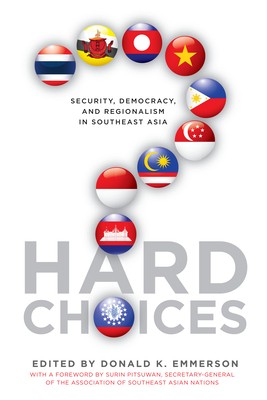
- We will send in 10–14 business days.
- Publisher: Shorenstein Asia-Pacific Research Center
- ISBN-10: 1931368139
- ISBN-13: 9781931368131
- Format: 15 x 22.4 x 2.8 cm, minkšti viršeliai
- Language: English
- SAVE -10% with code: EXTRA
Hard Choices (e-book) (used book) | bookbook.eu
Reviews
Description
Southeast Asia faces hard choices. The region's most powerful organization, ASEAN, is being challenged to ensure security and encourage democracy while simultaneously reinventing itself as a model of Asian regionalism. Should ASEAN's leaders defend a member country's citizens against state predation for the sake of justice--and risk splitting ASEAN itself? Or should regional leaders privilege state security over human security for the sake of order--and risk being known as a dictators' club? Should ASEAN isolate or tolerate the junta in Myanmar? Is democracy a requisite to security, or is it the other way around? How can democratization become a regional project without first transforming the Association into a "people centered" organization? But how can ASEAN reinvent itself along such lines if its member states are not already democratic? How will its new Charter affect ASEAN's ability to make these hard choices? How is regionalism being challenged by transnational crime, infectious disease, and other border-jumping threats to human security in Southeast Asia? Why have regional leaders failed to stop the perennial regional "haze" from brush fires in democratic Indonesia? Does democracy help or hinder nuclear energy security in the region? In this timely book--the second of a three-book series focused on Asian regionalism--ten analysts from six countries address these and other pressing questions that Southeast Asia faces in the twenty-first century.
EXTRA 10 % discount with code: EXTRA
The promotion ends in 22d.13:05:04
The discount code is valid when purchasing from 10 €. Discounts do not stack.
- Publisher: Shorenstein Asia-Pacific Research Center
- ISBN-10: 1931368139
- ISBN-13: 9781931368131
- Format: 15 x 22.4 x 2.8 cm, minkšti viršeliai
- Language: English English
Southeast Asia faces hard choices. The region's most powerful organization, ASEAN, is being challenged to ensure security and encourage democracy while simultaneously reinventing itself as a model of Asian regionalism. Should ASEAN's leaders defend a member country's citizens against state predation for the sake of justice--and risk splitting ASEAN itself? Or should regional leaders privilege state security over human security for the sake of order--and risk being known as a dictators' club? Should ASEAN isolate or tolerate the junta in Myanmar? Is democracy a requisite to security, or is it the other way around? How can democratization become a regional project without first transforming the Association into a "people centered" organization? But how can ASEAN reinvent itself along such lines if its member states are not already democratic? How will its new Charter affect ASEAN's ability to make these hard choices? How is regionalism being challenged by transnational crime, infectious disease, and other border-jumping threats to human security in Southeast Asia? Why have regional leaders failed to stop the perennial regional "haze" from brush fires in democratic Indonesia? Does democracy help or hinder nuclear energy security in the region? In this timely book--the second of a three-book series focused on Asian regionalism--ten analysts from six countries address these and other pressing questions that Southeast Asia faces in the twenty-first century.


Reviews